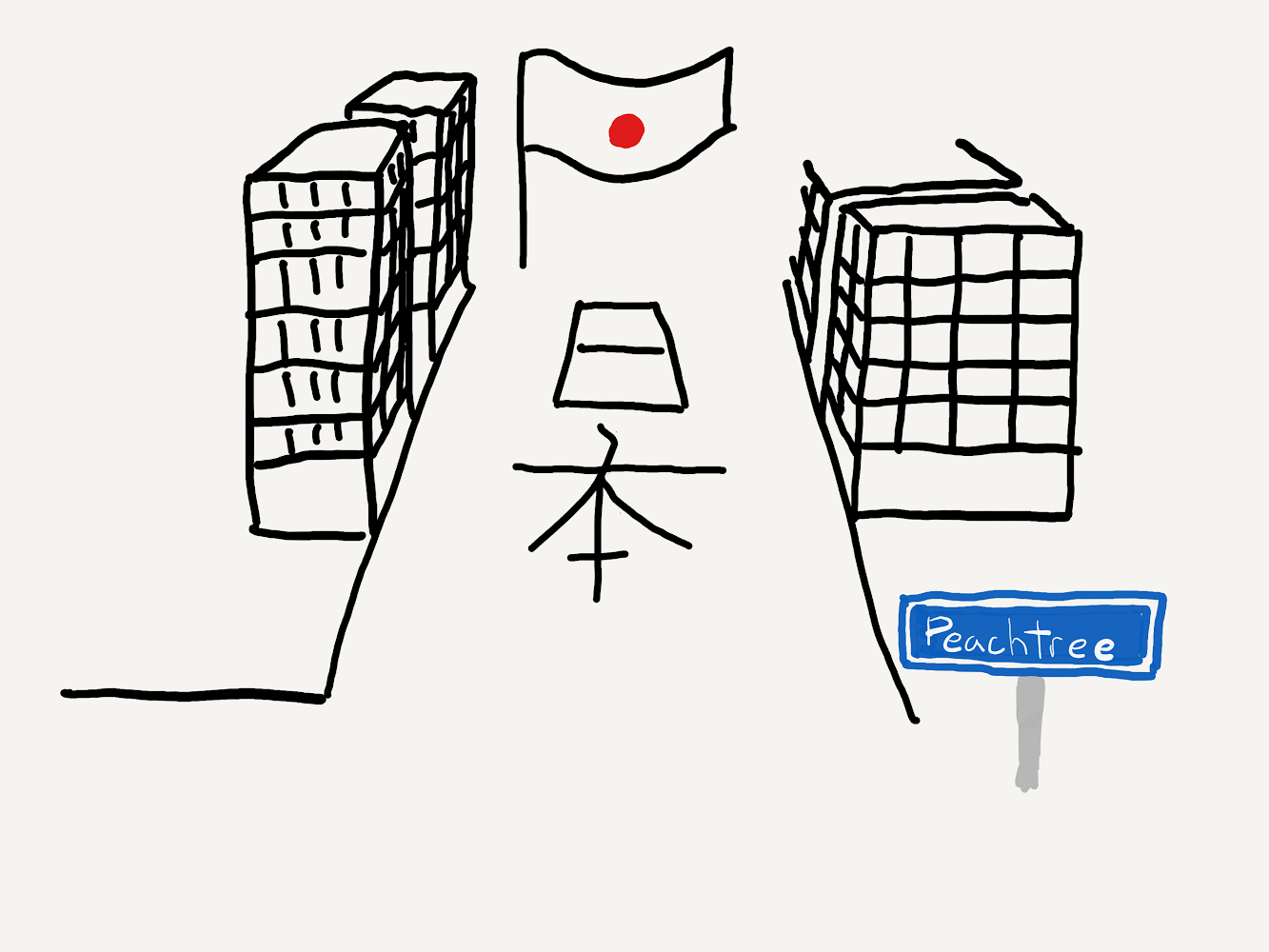
Landing in the JET Program.
A couple months before graduating as one of ten students in Centre College’s computer science program, I did the natural thing: applied to the JET Program to teach English in Japan. Five months later in early August I arrived alarmed and alone in Kamioka-cho, Hida-shi, Gifu-ken, Japan, but my favorite story about the JET Program is actually the the prelude: my final interview round in Atlanta.
Centre College is in, wait for it, the center of Kentucky, which makes the drive to Atlanta about six hours of communing with I-75. The day before my interview I drove down. This was the era of flip phones and printed directions, which I followed faithfully enough to reach my hotel and check in early that evening.
Atlanta was hot. My car was hot. Arriving felt good.
Maybe this is a good moment to mention that for a long time I had fairly intense anxiety around the idea of doing anything new. I can remember one evening in high school that I spent dreading having to submit a paper form—a form that I’d already completed—to the headmaster’s secretary the next day. The task itself, going to an office twenty feet from one of my classrooms and dropping off a piece of paper, couldn’t have been simpler, but I remember feeling incapacitated.
So for many folks, I suspect that driving to Atlanta and checking into a hotel wouldn’t have been too extraordinary an accomplishment, and by any useful ruler it really wasn’t very impressive for me either, but I was pretty pleased with myself. Pleased, but also self-aware enough to be terrified of driving and parking in downtown Atlanta the next day for the interview, which meant that the following morning I decided to walk.
The previous night I’d checked how long the walk would take on my laptop, and am a pretty quick walker, so I set off on time the next morning. Ten minutes before my interview was slated to begin, it had become exceedingly difficult not to acknowledge that I was well and truly lost. The consulate’s address was the typical Atlanta address: somewhere on one of the Peachtrees, and the websites instructions weren’t much more helpful, along the lines of “it’s the thirty story glass windowed building.”
It turns out, that’s pretty much every building in downtown Atlanta.
In desperation, I convinced myself that maybe the closest building was the one I was looking for–and at worst they’d be able to give directions–so I walked in and asked at the front desk if the Japanese consulate was here. The attendant got a thoughtful expression, and started listing a variety of other consulates that were in that building, which unfortunately didn’t include the one I was supposed to be interviewing at a few minutes later.
Too embarrassed to directly acknowledge how lost I was, I mentioned it was my first time in Atlanta and that it had been more confusing than I anticipated. The building attendant asked where I was from, and I said Asheville. He then asked me where I’d gone to school, and I mentioned the name of the boarding school I’d attended.
Then he asked me an unexpected question, did I know Billy Peebles, the previous headmaster of my boarding school? I did. More surprisingly, although following somewhat naturally from his question, the building attendant did as well. He’d moved to Atlanta to found a new boarding school, but the funding had fallen apart, and now he was working in this building instead.
Then this man, who I’d never met and would never meet again, drove me to the right building five minutes away. As he dropped me off at the right thirty-story glass building somewhere on Peachtree, I thanked him hurriedly and jumped out. Rushing into the lobby and exasperated ̉at the elevator’s methodical counting of the passing floors, I made it into the Japanese consulate five minutes late.
There were so many applicants that we’d been told they might not even interview folks who weren’t on time, and I was afraid I would be immediately disqualified for my tardiness. My day’s luck held again, and they were running six minutes behind, with me narrowly handing in my paperwork as they called me into the room for my interview. I walked into the interview and everything past that point is a blur. I roughly remember a questions about the extent of my familiarity with Japan, but the memories have subsequently blended together into a puree of exhilaration.
As I walked back to my hotel and got in my car, I put in a cd I’d burned in preparation for the trip, largely composed of songs from Music for Robots, a music blog that my roommate had introduced me to that year; merging onto I-75 heading north, I felt deeply and utterly alive.
I grew up in the Unitarian Universalist church, which I’d describe as having the best trappings of religion—community, acceptance, and occasionally even forgiveness—but with little to no codified dogma. There have been vanishingly few moments in my life where I’ve felt incomprehensible blessed, but music blaring and driving northward, that moment I was drowned in gratitude for the man who’d driven me to my interview, the process running six minutes behind, and everything, somehow, coming together.
Although I didn’t understand it at the time, reflecting a decade later, this is also a story about privilege. One of my many privileges is to have attended a small, affluent boarding school, where even someone very indirectly affiliated was willing to help me. Although this specifically wasn’t a huge act, it was the final lift that made it possible for me to teach in Japan.
Benefiting from privilege can be invisible to the participant, and it certainly was to me at the time. Over a lifetime, enough small favors and weighted odds shift the scales so pervasively that it’s surprisingly easy to convince yourself it isn’t even happening.